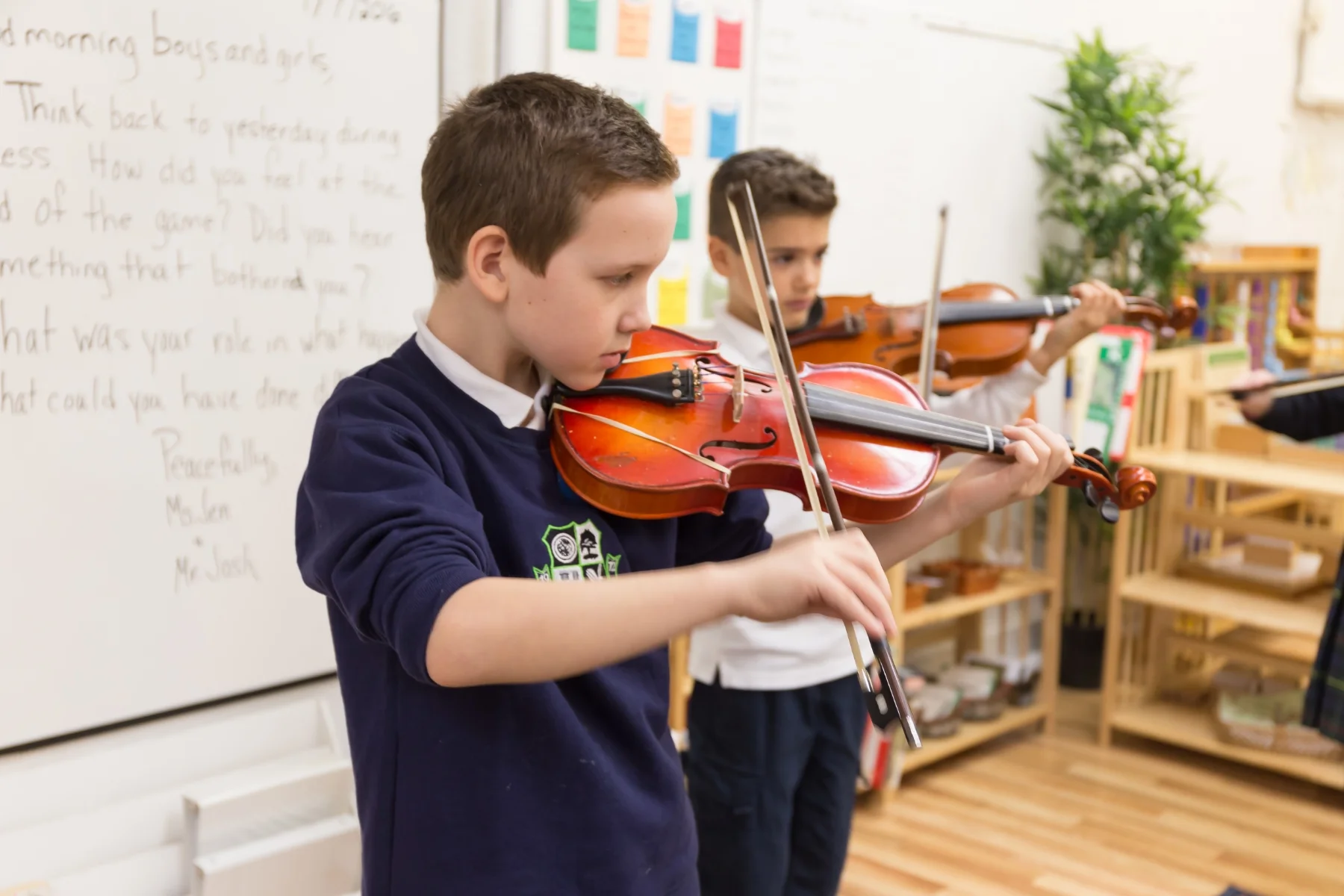A Typical Weekly Schedule for Elementary Students
8 - 8:25 am
Students arrive
8:30 – 11:30am
The large learning block of Montessori instruction is presented every day in all subject areas: Language, Mathematics, History, Geography, and Science.
11:30 - 12:00PM
Recess
12:00 - 12:30PM
Lunch
12:30 – 2:45PM
Music, Computer Science, Art, Physical Education, Spanish, and French
Language
Building on the child’s reading and writing foundation acquired in his pre-school and Kindergarten years, the Elementary school child begins the analysis of the sentence, the parts of speech (usage) and functions of parts of sentences (grammar). He learns to write and speak in clear, logical, concise form. He learns how to construct a play, write a speech or poem, debate a question. In addition, the program offers rich stimulation in cultural enrichment with daily reading and analysis of great literature old and new.
Foreign Language
Beginning with the two-and-a-half year old child, foreign language is an important part of the Willistown Country Day Montessori Schools program. Instructional French as well as conversational Spanish are offered to students from pre-school through the sixth grade.
Mathematics
Working from the “hands on” concrete mathematic materials devised by Dr. Montessori, the Elementary child gains a true understanding of arithmetic, plane geometry and algebra. Nowhere in the total program is the genius of Dr. Montessori more evident than in the wide array of workable mathematics materials. Progressing from “snake games” to “bead frames” and “power boards” to the “decanomial,” the child gains a “mathematic mind” eager to work figures and forms.
History
Starting with the study of how the earth was formed, when life first began, to the story of man on earth and the recorded history of early civilizations, the Elementary child explores the entire history of the world. He sees past accomplishments as contributions by his predecessors to the wonders man presently enjoys. This appreciation of the past gives the child a positive view of history. The Montessori student also acknowledges problems that plague mankind to this day, and he poses solutions that might someday eradicate them. He views himself as an active participant in mankind’s story.
Computer Literacy
It is important to prepare children for their scholastic and professional careers by making them well-rounded, proficient computer users in the areas of Applied Technology, Databases, Desktop Publishing, Graphics, Multimedia, Operating Environments, Programming, Spreadsheets, Telecommunications and Word processing. The computer literacy curriculum incorporates over 800 learning objectives that precisely define computer mastery in 10 technology areas. These learning objectives are taught sequentially so one skill builds on the next during a year long cycle of classes that emphasize discovery learning and problem solving through project-based, interdisciplinary activities.
Geography
How was our earth formed? Where is our place in the solar system today? Why does our earth constantly change and what is causing those changes? With a thorough understanding of the earth the Montessori students develops a keen ecological awareness. All this, plus the relationships between geographical features and man’s use of those features, lets the Elementary child discover how geography affects mankind. This leads to an intense study of economics of geography which dictates many of man’s actions for and against one another.
Science
Science experiments show the Elementary child how elements react to one another; how the solar system was born, how physical geographical features on the earth’s crust evolved, and how the animal and plant world must work together to maintain the necessary components for continued life on earth. Students perform their own experiments, and record and analyze their observations in a scientific manner. Students also make a detailed study of invertebrates and vertebrates with intensive work on the human body. Chemistry at work is a stimulating and favorite study of Montessori students. From “rot symposiums” to dissection of animals and their organs to cell study, hands-on science adds to the eagerness Willistown Montessori students show for finding out more.
Music
In the first through sixth grades, the study of notes, rhythm, and the staff, the child learns how music became termed the international language that all people can use to communicate. Group, choral, and solo singing, dancing and music appreciation are all part of the program. Keyboarding and recorders give students the opportunity to make music on their own while exploring melody, harmony and improvisation. Study of the lives of great composers add to the student’s cultural appreciation.
Art
Children who have worked with metal insets, sandpaper letters, and geometric shapes naturally become adept in working with artists materials. Refinement of color and texture through early sensorial materials leads to an awareness of possibilities in art, so we see growing interest and ability to express oneself in all media. Study of the great masters encourages experimentation in many different media and leads to aesthetic sensibilities. Art by students of Willistown Country Day Montessori Schools is often exhibited with local merchants and banks.
Physical Education
A wide range of skills are practiced during Willistown Country Day Montessori Schools’ weekly “gym classes.” Professional physical education teachers use age appropriate activities to build physical skills. They are also responsible for maintaining the course and insuring maximum development for each child.

